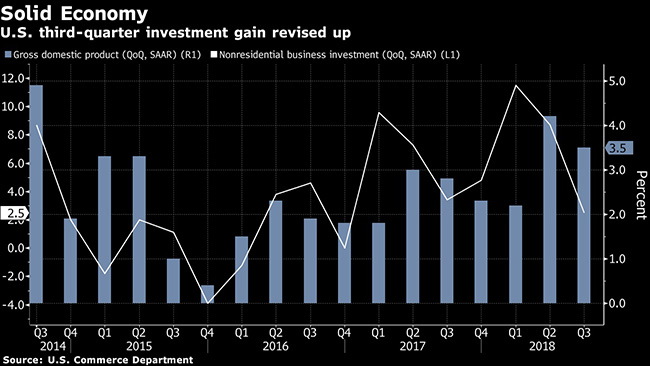Economy Grows at Unrevised 3.5% Pace in Third Quarter

The U.S. economy remained on a solid footing in the third quarter, matching previously reported results, as stronger business investment and a bigger boost from inventories cushioned a trade drag that matched the worst since 1984.
Gross domestic product grew at an unrevised 3.5% annualized rate, Commerce Department data showed Nov. 28, in line with the median forecast in a Bloomberg survey. Household spending, which accounts for about 70% of the economy, grew 3.6%, on weaker durable goods purchases.
The biggest change from the prior report on GDP, the value of all goods and services produced in the nation, came from stronger business investment, while most other categories were in line with earlier readings. Nonresidential fixed investment — which includes spending on equipment, structures and intellectual property — grew 2.5%. Economists are monitoring such spending because, along with consumer purchases, it was a main driver of growth in the first half.

Combined with a 4.2% pace of GDP growth in the April-to-June period, the results capped the best back-to-back quarters since 2014. At the same time, growth is projected to moderate this quarter.
Risks to the outlook include an escalating trade war with China, cooling global demand and rising borrowing costs, while the boost from President Donald Trump’s tax cuts is expected to wane next year. The report also provided a first glimpse of some key data: Corporate pre-tax earnings rose 10.3% from a year earlier, the most in six years, after a 7.3% advance. Gross domestic income rose 4%, the most since 2014.
Equipment spending was revised up to a 3.5% rise, while investment in structures showed a 1.7% drop compared with a previously reported decline of 7.9%.
Net exports subtracted 1.91 percentage points from growth, while inventories provided a 2.27-point boost. Stripping out the volatile components of trade and inventories, so-called final sales to domestic purchasers climbed at an unrevised 3.1% pace. Housing still posted a third consecutive drag on GDP growth and reaffirmed that the industry has entered a broad slowdown.
Residential investment fell 2.6%, compared with an initially reported contraction of 4%. Inflation rose an unrevised 1.7%. The Federal Reserve’s goal is 2% based on its preferred gauge tracking personal consumption expenditures. Excluding food and energy, the Fed’s preferred price index advanced 1.5%. Government spending increased at a 2.6% rate, adding 0.44 point to growth. The GDP report is the second of three estimates for the quarter; the third is due in December as more data become available.




